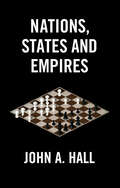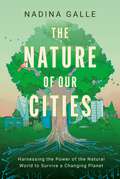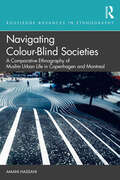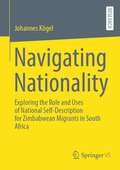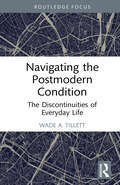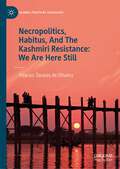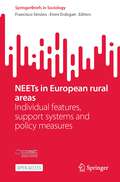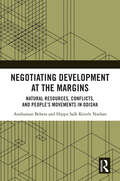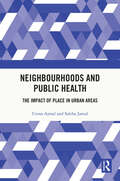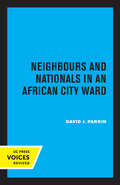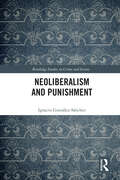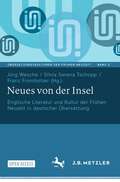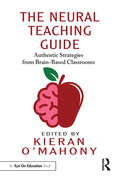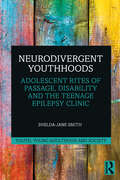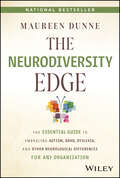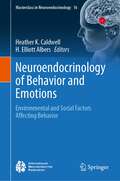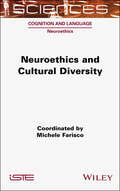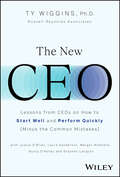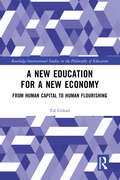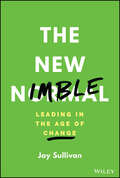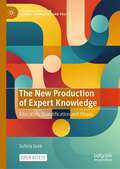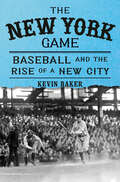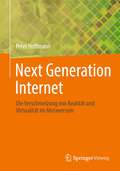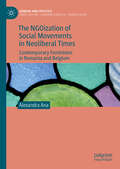- Table View
- List View
Nations, States and Empires
by John A. HallThis book traces the interactions between nations, states and empires in the making of the modern world. It is commonly assumed that nation states succeeded and replaced empires, relegating empires to the past: Hall argues that this is not the case. Empires have continued alongside nation states, shadowing them and overseeing them in the industrial era. The two world wars were imperial wars, rather than wars between nation states. Even after rapid decolonization in the 1950s and 1960s, empires persisted in the USA and the USSR. Furthermore, empires are not finished: the USA retains enormous power whilst Russia and China increasingly show imperial dispositions. Furthermore, empires and nation states do not exist in separate compartments— rather, they often overlap. Consider the USA—at once highly nationalist and the greatest empire in the history of the world. This highly original book will be essential reading for students and scholars in sociology and politics and for anyone interested in the political forces that have shaped, and continue to shape, the modern world.
The Nature of Our Cities: Harnessing the Power of the Natural World to Survive a Changing Planet
by Nadina GalleIn the tradition of Elizabeth Kolbert and Michael Pollan, The Nature of Our Cities is a stirring exploration of how innovators from around the world are combining urban nature with emerging technologies, protecting the planet’s cities from the effects of climate change and safeguarding the health of their inhabitants.We live in an age when humanity spends 90% of its time indoors, yet the nature around us—especially in America’s cities—has never been more vital. This distancing from nature has sparked crises in mental health, longevity, and hope for the next generation, while also heightening the risks we face from historic floods, heatwaves, and wildfires. Indeed, embracing nature holds untapped potential to strengthen and fortify our cities, suburbs, and towns, providing solutions spanning flood preparation, wildfire management, and promoting longevity. As ecological engineer Dr. Nadina Galle shows in The Nature of Our Cities nature is our most critical infrastructure for tackling the climate crisis. It just needs a little help. A fellow at MIT’s Senseable City Lab and selected for Forbes’ 30 under 30 list, Galle is at the forefront of the growing movement to fuse nature and technology for urban resilience. In THE NATURE OF OUR CITIES, she embarks on a journey as fascinating as it is pressing, showing how scientists and citizens from around the world are harnessing emerging technologies to unlock the power of the natural world to save their cities, a phenomenon she calls the “Internet of Nature.” Traveling the globe, Galle examines how urban nature, long an afterthought for many, actually points the way toward a more sustainable future. She reveals how technology can help nature navigate this precarious moment with modern advances such as:Laser-mapping that identifies at-risk neighborhoods to fight deadly health disparitiesA.I.-powered robots that prevent wildfires from reaching urban areasIntelligent water gardens that protect cities from floods and hurricanesAdvanced sensors that achieve 99% tree survival in dry, hot summers Optimistic in spirit yet pragmatic in approach, Galle writes persuasively that the future of urban life depends on balancing the natural world with the technology that can help sustain it. By turns clear-eyed and lyrical, THE NATURE OF OUR CITIES marks the emergence of an invigorating, prescient new talent in nature writing.
Navigating Colour-Blind Societies: A Comparative Ethnography of Muslim Urban Life in Copenhagen and Montreal (Routledge Advances in Ethnography)
by Amani HassaniNavigating Colour-Blind Societies is a comparative ethnography of racialisation, class, and gender in the lives of young Muslims coming of age in societies where race is deemed insignificant. The book offers insights into the urban lives of young middle-class Muslims in Copenhagen and Montreal. Based on their narratives, the book examines racialisation as (1) a social process that is classed and gendered and (2) a spatial process that is social and temporal. Denmark and Quebec have seen an increasing thrust of nationalist politics in recent years, which position their Muslim citizens as the quintessential “Other.” The book contributes to our understanding of how Muslims are racialised and how they navigate this process of racialisation in social and urban life. The interaction between movement and life stories provides a unique vantage point in bringing the city to life from the perspective of these young adults. The book appeals widely to academics and students in sociology, anthropology, and human geography. It also appeals to a wider audience interested in anti-racist scholarship and Muslim experiences in the Global North.
Navigating Nationality: Exploring the Role and Uses of National Self-Description for Zimbabwean Migrants in South Africa
by Johannes KögelIn recounting their migration journey, references to nationality pervade the narratives of Zimbabweans in South Africa. Given the challenges many migrants confront based on their nationality, this presents a seeming paradox. This qualitative interview study, conducted with Zimbabwean migrants in two areas of Cape Town—Observatory and Dunoon—aims to elucidate the nuances of national self-descriptions in a demanding environment. Identifying as Zimbabwean serves as a sanctuary and a retreat, where alternative identifications often prove transient; embracing Zimbabweanness fosters an affirmative and positive self-perception, surpassing the limitations of other collective self-descriptions. Rather than pre-emptively characterizing a nationalist demeanour, the articulation of national self-description emerges as a strategic tool to navigate experiences of hostility and discrimination, while also asserting legitimate claims to equal opportunities. In this way, nationality takes a trajectory that diverges from conventional notions of nationality (and the ones of the nation-state or citizenship) as per Northern theory, contributing to alternative conceptualizations within the framework of the Global South.
Navigating the Postmodern Condition: The Discontinuities of Everyday Life
by Wade A. TillettDrawing on poststructuralist frameworks, this book examines the way to a radical acceptance of daily discontinuities and difference as it allows us to embrace life in the postmodern world.With each chapter exploring the human relationship with a disjunction in daily life, such as sleeping, forgetting, and multitasking, the author examines overlooked aspects of daily living as fresh data from which to analyze our condition. A phenomenological study of postmodern life, the book provides anecdotes of what it is like to live through these gaps and theorizes how we use these gaps. Using an arts-based methodology, the author also allows the work to mirror the discontinuities which it describes, interrupting the assumption of our lives as continuous and unitary in both form and content. Addressing the vast jumble of contradictions that is our daily experience in this contemporary world, it offers explanation through theory and anecdote and illustrates the path toward radical acceptance, which allows us to see ourselves as beautifully composed of fractures, gaps, and overflow. It will appeal to scholars, researchers, and postgraduate students with interests in poststructuralism, curriculum theory, and art-based research methods.
Necropolitics, Habitus, And The Kashmiri Resistance: We Are Here Still (Global Political Sociology)
by Vinícius Tavares de OliveiraThis book engages the concept of necropolitics to present a vision of how to understand the physical body as a space of power and resistance to social order, in the context of the Kashmir resistance. The author sheds new light on the relations between India and Pakistan, with a focus on tensions over the Kashmir region, in order to better understand the emergence and stabilization of the narrative that criminalizes and thus justifies the population that rebels against state actions in the region. The research draws from archival and interview research and presents the reader with new insight into both conceptual and material dimensions of necropolitics.
NEETs in European rural areas: Individual features, support systems and policy measures (SpringerBriefs in Sociology)
by Francisco Simões Emre ErdoganThis open access book constitutes a transnational and multidisciplinary inquiry of the most pressing challenges faced by young people Not in Employment, nor in Education or Training (NEET) in rural areas across Europe. . Rural NEETs are one of the most invisible segments of the youth population, in spite of the fact that the percentage of NEETs is higher in the countryside, compared to those in suburban and urban areas across the EU and many of the Southern and Eastern European countries. This book identifies and analyses different factors that may contribute to or hamper youth social development and social inclusion. Among them are main individual features of rural NEETs, the quality and characteristics of rural NEETs' informal social networks and support, the singularities of formal and non-formal education in rural areas and how they shape the transition from school to work, the role of employment services in providing adequate institutional support, the importance of policy package designor the role of new paradigms of rural development to uphold vulnerable young people in the European countryside . The contributions offered in this book provide a new model of analysis and comprehension of rural NEETs' personal development and social inclusion. This book therefore establishes the state of the art regarding available knowledge on rural NEETs, and represents an inspirational resource for new research agendas on the subject of vulnerable rural youth in Europe. This book also forms the policy design in areas such as education, employment, and social welfare in rural areas.
Negotiating Development at the Margins: Natural Resources, Conflicts, and People’s Movements in Odisha
by Anshuman Behera Hippu Salk NathanThis book critically examines various facets of conflicts involving people and the state arising due to the uneven distribution of natural resources. It provides an overview of the people’s movements in Odisha, a resource-rich state in eastern India. Reflecting on the conceptual frameworks of conflict, it analyses violence, and struggle for rights over resources, and public policies around natural resources, alongside local strategies and governance. Drawing from extensive field surveys in the villages of Kalahandi and undivided Koraput districts in Odisha, this volume explores the sociopolitical and economical aspects of people’s movements instead of solely viewing them as political and security threats. The authors demonstrate the misappropriations of these movements by both the state and non-state actors for their vested interests. This book offers recommendations for policymakers to draw up a more ready response to mitigate and minimize the conflict and violence and implement equitable policies around land and resources. While doing so, the book also provides some primers to development perspectives, the role of natural resources and conditions under which the natural resources can result in conflict, and principles and practices to overcome such conflicts. The volume will be an indispensable read for researchers and students of social history, social reform, tribal and indigenous studies, postcolonial studies, exclusion studies, development studies, political sociology, and South Asian studies.
Neighbourhoods and Public Health: The Impact of Place in Urban Areas
by Uzma Ajmal Saleha JamalThis book examines the concept of neighbourhood over space and time and understands how neighbourhoods can impact human health and well-being. It discusses the identification of neighbourhood boundaries, features of individual neighbourhoods, and the concept of neighbourhood in some major world as well as Indian cities. Based on extensive research, this study refers to both primary as well as secondary sources of data using various statistical and geo-spatial techniques. The first section of the book focuses on the concept of neighbourhood, concept of neighbourhood unit, methods used in the identification of neighbourhood boundaries and theories related to neighbourhood effects on health. The subsequent section of the book deals with a case study on neighbourhood effects on health in an Indian city. The case study is followed by a comparison of its results with other global studies. This book will be useful to the departments of Geography, Public Health, Sociology and Social Work. It will also be of use to professionals and practitioners like city planners, architects, NGOs, Environmentalists, and urban policy makers.
Neighbours and Nationals in an African City Ward
by David ParkinThis title is part of UC Press's Voices Revived program, which commemorates University of California Press’s mission to seek out and cultivate the brightest minds and give them voice, reach, and impact. Drawing on a backlist dating to 1893, Voices Revived makes high-quality, peer-reviewed scholarship accessible once again using print-on-demand technology. This title was originally published in 1969.
Neoliberalism and Punishment (Routledge Studies in Crime and Society)
by Ignacio González-SánchezExploring the expansion of the penal system in Spain during the first 40 years of democracy, this book puts forward the importance of studying punishment from a sociological perspective and examines the neoliberal penality thesis.Today, Spain has more police officers and more people in prison than 50 years ago and a tougher penal code than that which existed at Franco’s death; however, crime has not increased for three decades, while most of the hardening of the penal system has occurred after its stabilisation. Studying the development of penality in Spanish democracy, this book explores Loïc Wacquant’s proposal that the expansion of the penal system should be understood as a characteristic of neoliberalism. It examines the parallel and reciprocal development of three policies in relation to the gradual implementation of neoliberal ideas and highlights how the evolution of the labour market, social policies, and the penal system are linked to one another and to neoliberal ideas related to the sacralisation of the utilitarian individual and the role of the state.Advocating for a sociological study of state punishment and contributing to a better understanding of the implementation of neoliberal policies, Neoliberalism and Punishment will be of great interest to students and scholars of criminology, sociology, and politics.
Neues von der Insel: Englische Literatur und Kultur der Frühen Neuzeit in deutscher Übersetzung (Übersetzungskulturen der Frühen Neuzeit #2)
by Jörg Wesche Silvia Serena Tschopp Franz FromholzerEin interdisziplinärer Band im Open-Access: Die Aufwertung der Volkssprachen in der Frühen Neuzeit führte zu einer Intensivierung und internationalen Öffnung der europäischen Übersetzungskultur. Der Gebrauch des Englischen bleibt in dieser Zeit allerdings weitgehend auf die Insel beschränkt, während die Sprache auf dem Kontinent noch wenig geläufig ist. Erst seit dem 18. Jahrhundert gewinnt sie an internationaler Bedeutung und steigt schließlich zur modernen Weltsprache auf. Der Band fokussiert auf die vormoderne Situation und untersucht in 19 literatur-, kunst-, philosophie- und frömmigkeitsgeschichtlichen Fallstudien die deutsche Rezeption der frühneuzeitlichen englischen Literatur und Kultur. Mit Blick auf das bislang unzureichend erforschte deutsch-englische Interaktionsfeld erhellt er ebenso ausgewählte Personen, Institutionen und Wissensfelder wie Werkübertragungen, Gattungstransformationen und Übersetzungspraktiken, die den bereits in dieser Zeit bemerkenswert dichten Austausch zwischen England und dem Alten Reich prägten. Welche Netzwerke und Medien ermöglichten z.B. die Rezeption einflussreicher Denker und Dichter wie Bacon, Hobbes oder Milton im deutschsprachigen Raum; wie kam es gleichsam im Mutterland des Protestantismus zu einer auffallend intensiven Übersetzung englischer Erbauungsliteratur; welche Rolle spielten Parallelübersetzungen oder auch Übersetzungen aus zweiter Hand, etwa dort, wo der kulturelle Transfer über eine dritte Sprache wie das Französische oder Niederländische erfolgte? Auf solche Fragen werden im Band neue Antworten gegeben.
The Neural Teaching Guide: Authentic Strategies from Brain-Based Classrooms
by Kieran O’MahonyThe Neural Teaching Guide showcases the innovative practices of K-12 teachers who are effectively applying findings from educational neuroscience into their classrooms. Educators today have remarkable opportunities to understand how the complex and often malleable functions of the brain affect learning, behavior, and social-emotional dynamics, but what practical strategies come out of this information? Authored by in-service teachers around the country, this book showcases a variety of brain-based approaches – cutting-edge yet intuitive, evidence-based yet accessibly translated – to helping children realize their potential at school. Both novice and veteran K-12 teachers alike will be reinvigorated to enhance students’ engagement and curiosity, nurture positive behaviors and self-regulation, support interest-based activities and inclusive interactions, identify biases and struggles, and more.
Neurodivergent Youthhoods: Adolescent Rites of Passage, Disability and the Teenage Epilepsy Clinic (Youth, Young Adulthood and Society)
by Shelda-Jane SmithAdolescent rites of passage are ubiquitous sociocultural processes that feature across all manner of social activity. As transitional healthcare becomes an increasing fixture within paediatric and adolescent healthcare, this book captures how normative, biomedical and psychologised understandings of youth development permeate social life. Through an in-depth institutional ethnography of a UK teenage epilepsy clinic, Shelda-Jane Smith shows how the prevailing social expectation of transforming from a dependent child into an independent, self-sufficient adult becomes the organising principle of clinical care. Interrogating the everyday work of the clinic and the experiences of parental and professional caregivers, Smith explores how the move from paediatric to adult healthcare gets renegotiated in the context of severe and profound learning disabilities, questioning what happens to transitional processes when young people do not conform to the social standards and expectations of youthhood that are placed upon them. From exploring the fervent application of neuro-psychological developmental models to interrogating expectations of individual independence, Smith draws from the disciplines of Science and Technology Studies, Critical Psychology and Disability Studies and Medical Anthropology to provide an invaluable lens for unpacking the underlying assumptions and tensions of care provision when young people do not emerge into adulthood in socially expected ways.
The Neurodiversity Edge: The Essential Guide to Embracing Autism, ADHD, Dyslexia, and Other Neurological Differences for Any Organization
by Maureen DunneIn The Neurodiversity Edge, renowned Oxford-trained cognitive scientist, neurodiversity expert, and business leader, Dr. Maureen Dunne presents a pioneering framework to harnessing the power of neurodiversity to navigate the most important human resources revolution in the modern era. Did you know that an estimated 1 in 5 people are “neurodivergent”—have a mind that works differently, such as the autistic, ADHDers, the dyslexic, synesthetes, and other unique neurotypes—and that the vast majority are motivated, capable, and unemployed? This indispensable guide is based on more than two decades of immersive cognitive science research, case studies, stories from neurodivergent voices, in-the-trenches work with hundreds of organizations from start-ups to global Fortune 500 titans, and Dr. Dunne's own lived experiences as a neurodivergent employer, entrepreneur, board member, and CEO. Too many unique minds and perspectives on the sidelines, and too many organizations beset by groupthink, innovation-stagnation, and a lack of access to qualified new candidates. The Neurodiversity Edge takes you all the way from why to what and to how, delivering practical insights that build on a new foundational framework: Cultivate a values-driven approach to building a culture of sustained authentic inclusion where everyone can thrive, How to improve the interview process to avoid missing game-changing talent Develop a hybrid office protocol that works for everyone and a support infrastructure that aligns with universal design principles Discover why Google's Project Aristotle found that innovation and performance hinge on psychological safety Uncover and eliminate the destructive influence of unconscious cognitive biases Take a graphic tour into the wonders of the human mind Understand unique problem-solving abilities such as lateral thinking, visual-spatial thinking, multisensory thinking, leaps of creative insight, hyperfocus, and many more How to articulate and implement organizational goals and measure progress toward them The Neurodiversity Edge is an essential guide for executives, board directors, human resources professionals, managers, recruiters, entrepreneurs, venture capitalists, allies, educators, nonprofit leaders, and anyone with an interest in better understanding neurodiversity, authentic neuroinclusion, and the human mind.
Neuroendocrinology of Behavior and Emotions: Environmental and Social Factors Affecting Behavior (Masterclass in Neuroendocrinology #16)
by Heather K. Caldwell H. Elliott AlbersThis volume highlights current research on how the neuroendocrine system helps to influence emotional states and ultimately behavioral output. Social relationships and context-appropriate behavioral responses are important for the survival of most vertebrate species. These relationships can range from transient social interactions to strong social bonding between sexual partners and social behaviors can be observed and evaluated from the individual- to the group-level. Further, behavioral output is shaped by complex interactions between the physical environment, genetics, experience, and context, and are often modulated by the neuroendocrine system. In this book, experts in the field will provide a sweeping look at novel research in the neuroendocrine regulation of important behaviors ranging from parental care to social homeostasis, with a focus on comparative studies across vertebrate species. The first part of the book is dedicated to theneuroendocrinology of relationships, including the coordination of acoustic signals in songbirds, the complexity of social relationships in primates, and cooperation and parenting in humans. The second part of the book focuses on social behaviors and provides some insights into their regulation, including the neuroendocrine regulation of maternal behavior in rodents, the roles of oxytocin and vasopressin in the modulation of sex-specific social behavior, the interactions between adult neurogenesis, the neuroendocrine system and social behavior, and a consideration of neuroendocrine influences on reproductive decision making across species. The book concludes with a section on environmental influences on neuroendocrine systems underlying behavior, including how social isolation and endocrine disrupting chemicals affect the neuroendocrinology of behavior and emotions. Given its breadth, this volume is appropriate for undergraduate students, graduate students, postdoctoral researchers, and established researchers who are interested in neuroendocrinology and behavior. This is the sixteenth volume in the International Neuroendocrine Federation (INF) Masterclass in Neuroendocrinology series, which aims to illustrate the highest standards and highlight the latest technologies in basic and clinical research and aspires to provide inspiration for further exploration into the exciting field of neuroendocrinology.
Neuroethics and Cultural Diversity
by Michele FariscoThere is a growing discussion concerning the relationship between neuroethical reflections and cultural diversity, which is among the most impactful factors in shaping neuroethics, both as a scientific discipline and a social enterprise. The impacts of culture on science and its public perception are particularly relevant to neuroethics, which aims to facilitate the creation of an interface between neuroscience and society at large. Time is ripe for neuroethics to review the influence of the culturally specific contexts from which it originated (i.e. North America and Western Europe) and to also include other cultural perspectives in the discussion. This book illustrates a convergent approach among different cultures in identifying the main issues raised by neuroscience and emerging technologies. This should be taken as a starting point for advancing in the search for shared solutions, which are, if not definitive, at least sufficiently reliable to be translated into democratic deliberative processes.
The New CEO: Lessons from CEOs on How to Start Well and Perform Quickly (Minus the Common Mistakes)
by Ty WigginsYour personal guide to navigating the first days, weeks, and months in the top job, based on powerful interviews with today's most successful CEOs. Becoming a CEO is a high-stakes moment, whether it's your first, second, or third time in the seat. What you say and how you act in your early days as CEO sets the tone for how you'll be perceived for years to come. Yet, until now, few CEOs have shared their stories on what worked, what didn't, and what they wish they'd done differently. In The New CEO, Dr. Ty Wiggins, an experienced leadership advisor specializing in CEO transitions, explains how to land well as a new CEO, accelerate your impact, and unlock the most affirming experience of your career. Drawing on compelling storytelling and groundbreaking research of hundreds of CEOs around the world, the book offers a incisive guide on what to say and do as a new CEO, including how to define your priorities, build your team, fast-track critical changes, work with the board, and set (or reset) the organization's culture. You'll also find: Why being a CEO is the toughest (and loneliest) job in business—and what to do about it. How to overcome the “First 100 Days” mindset and pressure for early wins to deliver sustainable, long-term success. How to avoid getting trapped in the “CEO Bubble,” as well as how to navigate (inevitable) challenges, knocks, and missteps. Perfect for newly appointed CEOs—whether it's your first time on the job or your second or third—The New CEO is also an essential resource for anyone seeking insights into the mindset and priorities of CEOs, including board members and directors, in-house counsel, leadership coaches, other executives, and consultants.
A New Education for a New Economy: From Human Capital to Human Flourishing (Routledge International Studies in the Philosophy of Education)
by Tal GileadProviding an in-depth, novel analysis of education’s role in today’s economy by scrutinizing its theoretical underpinnings, this volume critiques the suitability of the current, dominant economic framework for education and for shaping educational policymaking worldwide.Critically examining the history and philosophy that underpin our present societal understanding of the link between economics and education, the book argues for an urgent redefining of education’s role in the economy based on intellectual foundations that significantly differ from our current, dominant conceptions. Across seven chapters, the book posits that the adoption of a new philosophical framework, the reshaping of economic and educational aims, and the adjustment of our educational system are each necessary to better promote human flourishing.Ultimately providing a platform to entirely reconsider the idea that the primary aim of education is to serve the economic system – in particular, economic growth – this book will appeal to scholars, researchers, and postgraduate students studying educational policy, the philosophy of education, and the history of education more broadly. Education policymakers and academics studying education and the economy may also find this book of interest.
The New Nimble: Leading in the Age of Change
by Jay SullivanTransform your organization into an adaptable and flexible innovator In The New Nimble: Leading in the Age of Change, accomplished author, professor, and consultant Jay Sullivan delivers a clear, tangible, and actionable guide to implementing flexibility and creativity in your enterprise. Through interviews with senior leaders from a variety of industries and disciplines, the author shows you the trends and behaviors that allowed successful companies to navigate the constantly changing realities and complexities of the COVID-19 crisis. The book demonstrates how the most adaptable firms internalized and institutionalized lessons from the health emergency and applied those lessons to their everyday operations. You’ll discover: How to go beyond economic, business, and industry trends to make decisions based on immediately relevant—and rapidly changing—demands How to deal with pushback from staff, clients, and the public as you make the changes you need to make in your company Ways to apply the lessons from the COVID-19 crisis to the next unexpected and unpredictable emergencyAn essential and practical handbook for managers, executives, founders, directors, entrepreneurs, and other business leaders doing their best to manage their way through chaotic and volatile environments, The New Nimble is the hands-on leadership guide for a new world that we’ve all been waiting for.
The New Production of Expert Knowledge: Education, Quantification and Utopia (Palgrave Studies in Science, Knowledge and Policy)
by Sotiria GrekThis Open Access book offers a novel perspective on the role of quantification in the making of education utopias through an analysis of expert knowledge and its producers. Drawing on empirical findings from the European Research Council funded project ‘International Organisations and the Rise of a Global Metrological Field’ (METRO, 2017-2022), Education, Quantification and Utopia focuses on the ways that metrological realism has constructed a well-supported epistemic infrastructure, built on relationships and practices that go beyond the mere objectivity and reliability of numerical evidence. The book’s chapters outline how the production of new forms of education expertise have led to ideational and institutional interdependencies, and ultimately the making of an intricate, fragmented and opaque knowledge and governance web.
The New Tourist: Waking Up to the Power and Perils of Travel
by Paige McClanahanA brilliantly evocative, surprising, and page-turning exploration of how tourism has shaped the world, for better and for worse—essential reading for anyone looking for a deeper understanding of the implications of their wanderlust.Through deep and perceptive dispatches from tourist spots around the globe—from Hawaii to Saudi Arabia, Amsterdam to Angkor Wat—The New Tourist lifts the veil on an industry that accounts for one in ten jobs worldwide and generates nearly ten percent of global GDP. How did a once-niche activity become the world&’s most important means of contact across cultures? When does tourism destroy the soul of a city, and when does it offer a place a new lease on life? Is &“last chance tourism&” prompting a powerful change in perspective, or driving places we love further into the ground? Filled with revelations about an industry that shapes how we view the world, The New Tourist spotlights painful truths but also delivers a message of hope: that the right kind of tourism—and the right kind of tourist—can be a powerful force for good.
The New York Game: Baseball and the Rise of a New City
by Kevin BakerA hugely entertaining history of baseball and New York City, bursting with larger-than-life figures and fascinating stories from the game&’s beginnings to the end of World War II.Baseball is &“the New York game&” because New York is where the diamond was first laid out, where the bunt and the curveball were invented, and where the home run was hit. It&’s where the game&’s first stars were born, and where everyone came to play or watch the game. With nuance and depth, historian Kevin Baker brings this all vividly back to life: the still-controversial, indelible moments—Did the Babe call his shot? Was Merkle out? Did they fix the 1919 World Series? Here are all the legendary players, managers, and owners, in all their vivid, complicated humanity, on and off the field. In Baker&’s hands the city and the game emerge from the murk of nineteenth-century American life—driven by visionaries and fixers, heroes and gangsters. He details how New York and its favorite sport came to mirror one another, expanding, bumbling through catastrophe and corruption, and rising out of these trials stronger than ever. From the first innings played in vacant lots and tavern yards in the 1820s; to the canny innovations that created the very first sports league; to the superb Hispanic and Black players who invented their own version of the game when white baseball sought to exclude them. And all amidst New York&’s own, incredible evolution from a raw, riotous town to a new world city. The New York Game is a riveting, rollicking, brilliant ode to America&’s beloved pastime and to its indomitable city of origin.
Next Generation Internet: Die Verschmelzung von Realität und Virtualität im Metaversum
by Peter HoffmannDie Entwicklung des Internets, insbesondere des WWW, stößt aktuell an ihre Grenzen – sowohl technisch als auch sozio-kulturell und ökonomisch. Als Lösung wird ein neues Internet versprochen, das die Grenzen der realen und der virtuellen Welt überwinden und Realität und Digitalität verschmelzen soll – das Metaversum. Technische, semantische und organisatorische Details greifen hierzu eng ineinander. Was aber bedeutet dies bei genauerer Betrachtung? Welche technisch-technologischen Herausforderungen müssen bewältigt werden, um ein solches Verschmelzen zu erreichen? Welche ökonomischen Möglichkeiten eröffnen sich– und welche verbieten sich möglicherweise? Wie kann erreicht werden, dass ein offenes und für jeden benutzbares Metaversum entsteht? Und wie kann vermieden werden, dass auch in diesem neuen Metaversum wenige große Anbieter ihre proprietären Ideen durchsetzen? Für diese Fragen soll dieses Buch Antworten aufzeigen.
The NGOization of Social Movements in Neoliberal Times: Contemporary Feminisms in Romania and Belgium (Gender and Politics)
by Alexandra AnaDrawing on theories in politics, sociology, gender and feminist studies, and social movement studies, this book compares and contrasts NGOized feminist organizations and informal street feminist groups in Belgium and Romania in order to understand the transformation of modern and contemporary feminist movements. Chapters trace the development of this NGOization process and its entanglements with neoliberal modes of governance and techniques and proposes an historically and empirically grounded analytical model to studying the NGOization of feminist movements as a multidimensional process. By analyzing the NGOization process through a cross-national comparison based on very different cases, the book disentangles the links between institutionalization, professionalization, bureaucratization and precarization and brings clarifications concerning the outcomes associated with them, such as demobilization, depoliticization, co-optation and burn-out. This book places the NGOization offeminist movement organizations within the specific context of relations between the state and the market in neoliberalism. This book will be of interest to scholars and researchers across Gender & Feminist Studies, Social Movements, Sociology, and Politics.
